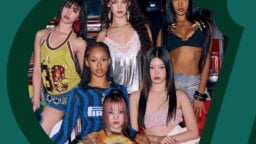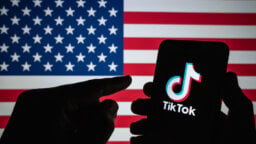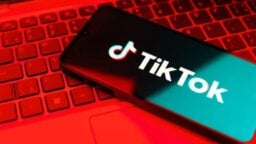Everything’s got a bit cozy this summer.
We haven’t had a proper public falling out in the music industry for some time now. But, up steps Triller.
This week, the US-based social video company published an open letter from its CEO Mahi de Silva, calling for “every American” to delete its rival TikTok.
The letter, in which Triller’s CEO “calls for every American to delete TikTok today and the US Government to take direct and overdue action to ban TikTok”, echoes security concerns raised by officials in the US.
FCC Commissioner Brendan Carr, for example, recently called for TikTok’s removal from the Google Play and Apple App stores, following the publication of a BuzzFeed report that claimed US user data was being accessed from China via the platform.
Carr published his own letter last month addressed to Google/Alphabet CEO Sundar Pichai and Apple CEO Tim Cook, requesting the removal of the app from their stores, echoing the Trump administration’s complaints about the app when it wanted to ban TikTok in the US in 2020.
Within the letter published this week, Triller’s de Silva writes that, “as the CEO of a global company whose mission is to help creators take control of their destiny in the creator economy, leveraging transformative adaptive technology, I stand with a growing chorus of elected officials, regulators, intelligence officials, other global executives, and consumers who recognize the enormity of the devastating impact of TikTok on our society”.
He adds: “The danger signs abound from the leaders of our intelligence community to the most versatile and connected technology journalists. Every American parent needs to ask what this social video app knows about their children and how those signals are used to get a deeper understanding of the location, preferences, and habits of their parents and the entire family.”
Additionally, de Silva says that he is “calling on the US government to take immediate action and ban TikTok and its Chinese-owned parent ByteDance“.
He adds: “The stakes have never been higher.”
Amongst many eyebrow-raising claims from Triller within the letter, perhaps none will raise eyebrows higher than this one:
“As Triller has expanded to build the platform for creators and to lay the foundation for its first-of-its-kind Creator Platform, we have developed a far more profound understanding of the creator economy. Through our lens, which watches over 175 billion social media content items per quarter, covering over 2 million creators and 25,000 brands, we have witnessed that TikTok suppresses the content and contributions from Black creators, making that content invisible to its audiences.”
(With that level of accusation flying, it would perhaps be remiss for MBW not to note here that Khaby Lame recently became the most-followed account globally on TikTok.)
“Every American parent needs to ask what this social video app knows about their children and how those signals are used to get a deeper understanding of the location, preferences, and habits of their parents and the entire family.”
Mahi de Silva, Triller
This isn’t the first public fallout that Triller has been involved in of course.
Just last year, Triller published a statement which, read: “Triller has no use for a licensing deal with Universal Music Group.”
That statement came after UMG announced it was pulling its music off Triller in protest at the video platform not clearing the rights to its catalog.
Triller then claimed that it did “not need a deal with UMG to continue operating as it has been since [Universal’s] relevant artists are already shareholders or partners on Triller, and thus can authorize their usage directly”.
(In May 2021, Triller and UMG jointly announced that they had extended their worldwide licensing agreements spanning both recorded music and publishing.)
Triller’s letter calling for Americans to delete TikTok follows last month’s news that the company has filed to go public in the US on the NASDAQ.
On June 30, Triller announced, in a very short statement, that it had “confidentially submitted” a draft S-1 filing with the SEC in the states “relating to the proposed public listing of [Triller’s] Class A common stock”.
Other details were thin on the ground (hence the “confidential” submission), but Triller added: “The public listing is expected to take place after the SEC completes its review process, subject to market and other conditions.”
You can read Triller CEO Mahi de Silva’s letter in full below:
As the CEO of a global company whose mission is to help creators take control of their destiny in the creator economy, leveraging transformative adaptive technology, I stand with a growing chorus of elected officials, regulators, intelligence officials, other global executives, and consumers who recognize the enormity of the devastating impact of TikTok on our society. The danger signs abound from the leaders of our intelligence community to the most versatile and connected technology journalists. Every American parent needs to ask what this social video app knows about their children and how those signals are used to get a deeper understanding of the location, preferences, and habits of their parents and the entire family. The petaflops of data sent from American TikTok users start with content preferences and location information that can quickly lead to the determination of home ownership, work, and vacation schedules and a host of much more granular data on every aspect of our American lives.
Today, we call for every American to remove TikTok from their devices immediately. Additionally, Triller calls on the U.S. government to take immediate action and ban TikTok and its Chinese-owned parent ByteDance. The stakes have never been higher.
Professor Scott Galloway’s recent piece, TikTok: Trojan Stallion, illustrated this deftly:
“The Chinese government has the power to access the data of private-sector companies whenever it wants. A wide range of laws makes this possible, including the Law of Guarding State Secrets: If you’re suspected of harboring sensitive state information, you must grant access. The state takes small ownership positions known as golden shares (that typically come with board seats) in businesses deemed strategic to the state. One of those golden share arrangements is with ByteDance. And though TikTok is not accessible to Chinese consumers, Chinese access to TikTok’s data is not in dispute. In June, Buzzfeed obtained over 80 audio recordings of internal TikTok meetings, confirming that Chinese management at ByteDance had unfettered access to TikTok’s data. A TikTok manager refers to an engineer in Beijing, known as the ‘Master Admin,’ who “has access to everything.”
This creates some meteoric concerns around TikTok in the United States.
The AI systems that drive the recommendation of short-form videos will be expanded to influence e-commerce and its associated supply chain, which, in turn, will shape and influence the future of American commerce. The Chinese-owned Bytedance and its agent in the United States, TikTok, already have the lion’s share of digital attention, where Americans spend up to 90 minutes a day scrolling through AI-recommended content, far more than the time spent on platforms like Google, Facebook, or Amazon.
More importantly, our concerns as Americans should extend beyond our wallets to the very backbone of our society: representative democracy and free speech. The AI systems controlled by Chinese-owner ByteDance and delivered via TikTok are the penultimate tool to influence our youth by shaping content and perceptions favoring a pro-China agenda.
It is clear that in the lexicon of technology, the signal-to-noise ratio for TikTok and its Chinese-owned parent ByteDance is all signal. It has become unavoidable that TikTok’s overweight position in the marketplace is not simply a threat within the creator ecosystem but a threat to our entire economy, because its Chinese owners don’t have to abide by the same rules as other platforms in this space. These present and future dangers threaten the whole of the American innovation economy.
We understand that some may counter that Google, Facebook, and Triller also collect a myriad of digital grains of sand on users; however, like every other U.S. company, Triller operates under the laws of the United States. It also may seem convenient for a company to call for the ban of the biggest company in its space. But at our core, Triller is about giving creators complete control over their content and their fan data — and ultimately … complete control of their destiny.
As Professor Galloway rightly concluded, we have, as a society, welcomed a foreign actor to seduce our children and dominate this market, and we have done so without objection.
Triller believes that must end.
As Triller has expanded to build the platform for creators and to lay the foundation for its first-of-its-kind Creator Platform, we have developed a far more profound understanding of the creator economy. Through our lens, which watches over 175 billion social media content items per quarter, covering over 2 million creators and 25,000 brands, we have witnessed that TikTok suppresses the content and contributions from Black creators, making that content invisible to its audiences. It is indisputable that the TikTok AI algorithm designed by ByteDance is the ultimate propaganda tool — and it is why India has banned the app from its citizens. Another example is TikTok’s role in the recent Philipino elections for Bong Bong Marcos, as detailed by Bloomberg. As the article expertly assigns culpability to TikTok’s role in rewriting the history of the Philippines, it should also be a clarion call for each of us to understand that that exact mechanism is in each of our homes.
There is no doubt that TikTok plays a central role in enabling surveillance networks inside and outside China. The avenues that these technologies can access our lives are almost unlimited. This is a clear and present danger and a national security issue.
Look at the breadth of data that TikTok has access to and understands. Then, marry it with the broader concerns that our political leaders, intelligence community, and business leaders are raising — where there is smoke, there is fire.
Triller is pulling the fire alarm today.
We do not have time to waste.
Triller, the platform for creators by creators, has built a network of creator-first services and products. It has assembled a revolutionary ecosystem to serve the immediate and long-term needs of those who seek to share their passions with the world. While our focus is on the creator and the future of the creator economy, we believe the broader future of American innovation is at risk because of our continued indifference to this threat that is literally in our hands.
Join us today and take action. Join us and all clear-thinking, freedom-loving Americans who believe in free markets, creative freedom, innovation, and a future where we can direct our lives unhindered by dark forces.
Mahi de Silva
CEO
Triller, Inc.Music Business Worldwide





